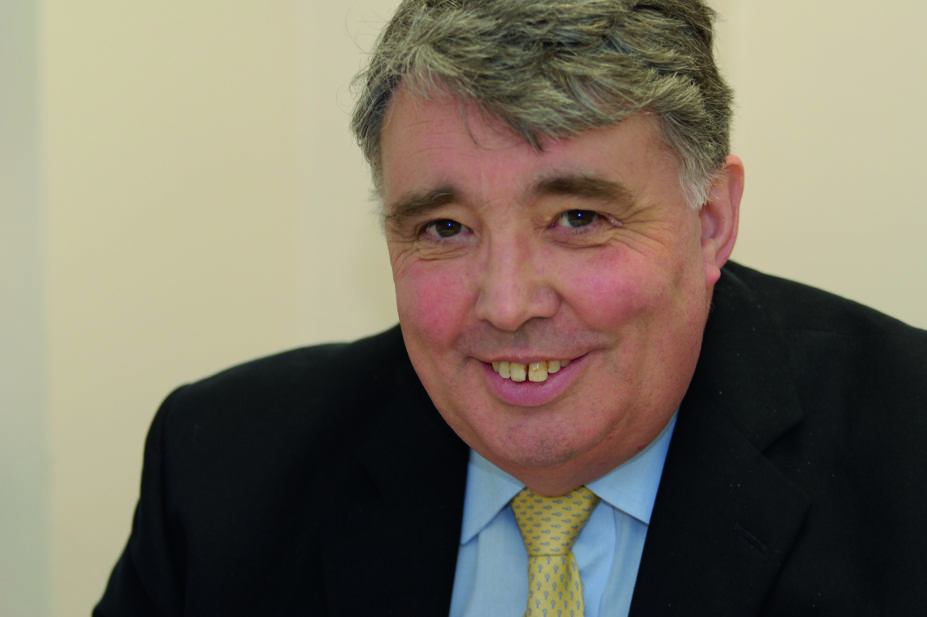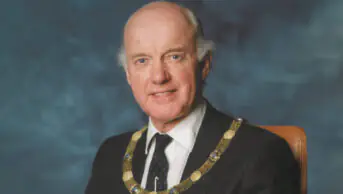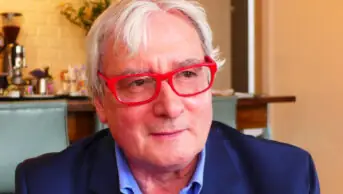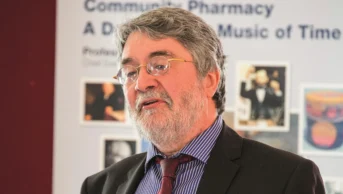
Peter Noyce, who has died aged 70 of a brain tumour, was a leader in pharmacy practice who established the Drug Usage and Pharmacy Practice Group at Manchester University, where he was emeritus professor.
A former deputy chief pharmacist at the Department of Health (DH), his career included hospital posts, government and academia. In retirement he became a trustee, then chair, of the charity Pharmacist Support.
Keith Ridge, chief pharmaceutical officer for England, who was mentored by Noyce during his PhD, considers him “the most effective pharmacist of his generation”.
He was made a fellow of the Royal Pharmaceutical Society (RPS) in 1994 and received the Society’s gold medal in 2002. He was awarded a CBE for services to healthcare in 2008, and made a fellow of the International Pharmaceutical Federation the same year.
Born in Eastleigh, Hampshire, Noyce originally hoped to be a veterinarian surgeon, but failed the 11 plus and did not get the required A-level grades for a veterinary course. Accepted through clearing at the Welsh School of Pharmacy, he found he loved the subject and obtained a first class degree, followed by a PhD, also from Cardiff.
During professional pre-registration training in the 1970s at the Westminster hospital group, London, he met his wife Sue, who is also a pharmacist. “He told me ‘one day we are going to have professors of pharmacy practice and I want to be one’,” she said. He became professor of pharmacy practice at Manchester University in 1991 at the age of 45. During his time there he established a unit to study the pharmacy workforce and published more than 100 papers.
Christine Bond, chair of the RPS Pharmaceutical Science Expert Advisory Panel and editor of the International Journal of Pharmacy Practice, said: “I will personally remember Peter for the central role he played in the emerging area of pharmacy practice research, through the establishment of the Pharmacy Practice Research Enterprise Scheme, and the research team he subsequently led at the University of Manchester.”
After a lectureship in pharmaceutics at Chelsea (now King’s) College, London, in 1973–1975, Noyce became regional specialist pharmacist at North West Thames Regional Health Authority, then chief pharmacist at Northwick Park hospital and pharmaceutical officer for Hampstead and Islington. In 1983 he was a member of the Nuffield Committee of Inquiry into Pharmacy, which identified the need for academic research into pharmacy practice. In 1986 he was appointed deputy chief pharmacist and head of pharmacy practice at the DH, where he spent four years.
He was a professional adviser to the DH working group that led to the establishment of the new regulator, the General Pharmaceutical Council (2007–2009) and a UK Medicines Commissioner (2002–2005). He was also an adviser to the New Zealand and Chinese governments.
“Peter was an intellectual heavyweight and passionate advocate for pharmacy who could be critical when needs be,” recalls Nicola Gray, an independent pharmacist researcher, who worked with him when he supervised her PhD at Manchester in the 1990s. “He was a great listener and knew how to get the best out of people. At one point I hit a wall and felt overwhelmed with all the data, but after discussion with Peter the thread was clear.” “He could always see the big picture and move things on to another level,” she added.
“His lifelong aspiration was for the profession to look critically at itself, and improve,” she said. “He understood the balance of regulation and facilitation.”
Catherine Duggan, director for professional development of the RPS, said: “Peter was one of the founding fathers of pharmacy practice research and was always a leading light while I was undertaking my PhD in the mid-1990s. His research has led and influenced practice across the profession and will continue to be referred to as seminal work in the area of professional and service development. I will personally remember Peter as a wise man, always prepared to offer helpful advice and support, most often with a witty retort.”
“Peter played a significant role within the RPSGB and subsequently the RPS for more than two decades. He was influential in the establishment of the new RPS (through the Professional Regulation and Leadership Oversight Group) and, thereafter, a firm supporter of the Faculty Board,” said Peter Kopelman, chairman of the RPS Faculty Board.
Darren Ashcroft, professor of pharmacoepidemiology at Manchester University, said: “Peter knew that capacity building for pharmacy practice research was vital if the discipline was to succeed and recognised the value of other disciplines, particularly social sciences. He leaves behind a meaningful legacy in the students, professionals, researchers and teachers he mentored in his 25-year career as an academic.”
In a joint statement with Andrew Evans, Rose Marie Parr and Mark Timoney, respectively, chief pharmaceutical officers for Wales, Scotland and Northern Ireland, and Keith Ridge, England’s chief pharmaceutical officer, described Noyce as “the most effective pharmacist of his generation” who had a major impact on the NHS as well as education and the evidence base for pharmacy practice. “He was a great pharmacist and a great individual,” he said.
“It was no surprise that it was Peter, as deputy chief pharmaceutical officer at the DH, set out the vision for clinical pharmacy in hospital practice through the landmark circular ‘(88) 54 The Way Forward for Hospital Pharmaceutical Services’,” Ridge said.
John Cromarty, former director of pharmacy at NHS Highland, who knew Noyce for more than 30 years, said: “Peter was very much a team player on committees and working groups. He had great vision and a full house of inter-personal skills. He was always very well prepared, reflective and analytical, summarising the input of other members, acknowledging their contributions and building on them. His contribution to education and training at all levels was immense.”
Noyce, who lived in Lymm, Cheshire, is survived by his wife, Sue, former project lead on community healthcare at Central and Eastern Cheshire Primary Care Trust, and former adviser to the National Clinical Assessment Service, his son, Alastair, a senior registrar in neurology at Royal London hospital and daughter, Rosie, a clinical psychologist in Manchester.
You may also be interested in

Philip Leon Marshall Davies (1938–2026)

Bill Scott OBE (1949–2025)
